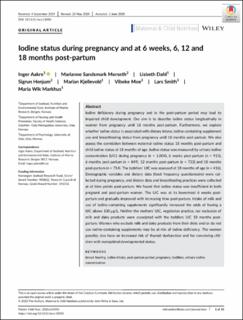Iodine status during pregnancy and at 6 weeks, 6, 12 and 18 months post-partum
Aakre, Inger; Morseth, Marianne; Dahl, Lisbeth Jane; Henjum, Sigrun; Kjellevold, Marian; Moe, Vibeke; Smith, Lars; Markhus, Maria Wik
Peer reviewed, Journal article
Published version
Permanent lenke
https://hdl.handle.net/11250/2725809Utgivelsesdato
2020Metadata
Vis full innførselSamlinger
- Articles [3012]
- Publikasjoner fra CRIStin [3070]
Sammendrag
Iodine deficiency during pregnancy and in the post‐partum period may lead to impaired child development. Our aim is to describe iodine status longitudinally in women from pregnancy until 18 months post‐partum. Furthermore, we explore whether iodine status is associated with dietary intake, iodine‐containing supplement use and breastfeeding status from pregnancy until 18 months post‐partum. We also assess the correlation between maternal iodine status 18 months post‐partum and child iodine status at 18 months of age. Iodine status was measured by urinary iodine concentration (UIC) during pregnancy (n = 1,004), 6 weeks post‐partum (n = 915), 6 months post‐partum (n = 849), 12 months post‐partum (n = 733) and 18 months post‐partum (n = 714). The toddlers' UIC was assessed at 18 months of age (n = 416). Demographic variables and dietary data (food frequency questionnaire) were collected during pregnancy, and dietary data and breastfeeding practices were collected at all time points post‐partum. We found that iodine status was insufficient in both pregnant and post‐partum women. The UIC was at its lowermost 6 weeks post‐partum and gradually improved with increasing time post‐partum. Intake of milk and use of iodine‐containing supplements significantly increased the odds of having a UIC above 100 μg/L. Neither the mothers' UIC, vegetarian practice, nor exclusion of milk and dairy products were associated with the toddlers UIC 18 months post‐partum. Women who exclude milk and dairy products from their diets and/or do not use iodine‐containing supplements may be at risk of iodine deficiency. The women possibly also have an increased risk of thyroid dysfunction and for conceiving children with nonoptimal developmental status.
